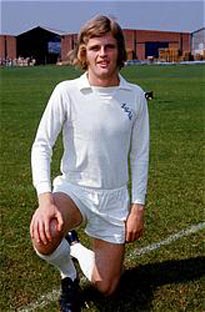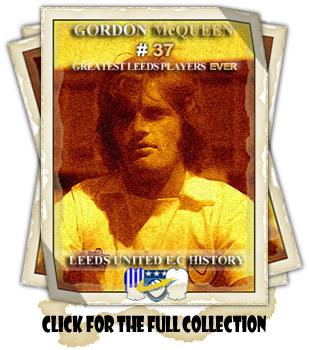

McQueen: Gordon
1972-1978
(Player Details)
Centre Half
Born: Kilbirnie, Ayrshire: 26-06-1952
Debut: v Derby County (a): 03-03-1973
6’3 1/2” 13st (1977)
#37 in 100 Greatest LUFC Players Ever

At School McQueen was a goalkeeper, following in the footsteps of his father, Tom, who
kept goal for Hibernian, Berwick Rangers, East Fife and Accrington Stanley. He switched to
the wing before settling down at centre-half where his aerial power made him a formidable
opponent. He had unsuccessful trials with Liverpool and Rangers before joining St Mirren
from Largs Thistle in February 1970 at the age of eighteen. He attracted the attention of
several clubs, but Leeds, looking for a successor to Jack Charlton, signed him for £30,000
in September 1972. He scored five goals in fifty-eight League games and a total of six goals
in seventy-seven in all games while at Love Street. Charlton played for some of the 1972-73
season, but had decided to quit as it drew to a close. McQueen played six times in his first
season at Leeds but missed out on the FA Cup Final against Sunderland, with manager Don Revie
preferring the experience of utility player Paul Madeley. It was never in doubt that McQueen
would not eventually became the Leeds lynch-pin, but he was also not selected for the European
Cup Winners Cup Final against AC Milan a few days later, which Leeds lost by the same
scoreline, but came on as a fifty-fourth minute substitute for Frank Gray. With Jack Charlton
gone and Paul Madeley used as the team's player-of-all-positions, McQueen was in the team for
most of the 1974-75 season and was chosen at Centre-Half in the PFA Team of the Year for the
First Division for that season. Leeds won the League Championship, going twenty-nine games
without defeat at the start of the season, and McQueen played a crucial part as Norman Hunter’s
defensive partner. He developed into an outstanding central defender and on 1st June 1974 he
won his first Scottish cap at the Stade Klokke, Bruges, in a 2-1 defeat by Belgium. A second
cap followed on 20th November 1974 as Scotland was defeated 1-2 by Spain at Hampden Park in
Group Four of the European Championship Qualifiers. He retained his position for the return
match at the Luis Casanova Stadium in Valencia when Spain were held to a 1-1 draw and he
became the regular Scotland Centre-half as he started to rapidly accumulate further Scottish
Caps. His fourth cap came in a 1-0 win over Portugal at Hampden Park on 13th May 1975 and four
days later he got his fifth at Ninian Park, Cardiff, in a 2-2 draw with Wales in the first of
the Home International of that season and three days later he was back at Hampden Park as
Scotland beat Northern Ireland 3-0 and on 24th May he got his seventh cap in the third of the
Home Championships as England humbled the Scots 5-1 at Wembley Stadium. He was captain in his
eighth appearance on 1st June 1975 as Scotland held Romania to a 1-1 draw at the National
Stadium Bucharest, with McQueen scoring his first goal for Scotland with an eighty-ninth
minute equalizer in another Group Four qualifier. His ninth cap was also in the Group Four
Qualifier as Scotland defeated Denmark 1-0 at Idraetsparken, Copenhagen on 3rd September 1975.
McQueen and Hunter excelled at the back in the following season of 1975-76, notably in Leeds'
campaign in the European Cup, during which McQueen scored three goals. However, he was
suspended for the final after being sent off in the semi-final against Barcelona, and in the
final Leeds lost 2-0 to Bayern Munich. McQueen watched the action from the stands after seeing
red in the second leg of the semi-final after being sent off at the Nou Camp after punching
Barcelona’s Manuel Clares. Recalling that night, he said: “It was very difficult at the time;
when someone spits in your face. Everyone says count to ten. But I did count to ten – and then
knocked him out! “I just swung for him and it’s something I’ve regretted ever since – missing
the final in Paris. ”With Revie gone and the mentors around him starting to leave or retire,
McQueen found himself growing up in the game quickly,labelled as one of the bright prospects
for Leeds' post-Revie future. It never happened. Leeds declined into mediocrity as a team
while McQueen's standing as a player increased. However, for Scotland, he was forced to miss
seven internationals when he suffered a pulled muscle and an Achilles tendon injury. He made
his comeback for his national team in the Group Seven qualifiers in the World Cup, the first
being in a 0-2 defeat by Czechoslavakia on 13th October 1976 at the Sparta Stadium, Prague,
followed by his eleventh cap in a 1-0 win over Wales at Hampden Park on 17th November 1976.
He played all three of the home internationals that season to take his caps to fourteen as
there was a 0-0 draw with Wales at the Racecourse Ground Wrexham on 28th May 1977 and four
days later there was a 3-0 win over Northern Ireland at Hampden Park, when McQueen registered
his second International goal with the second of those goals in the sixty-first minute. His
third goal came in the very next match when he opened the scoring two minutes before the
interval against England at Wembley with a passionate, loud and mildly inebriated Scotland
following loyally cheering their team on. McQueen rose above the England defence to head
home from a corner to send them into raptures. A second goal from Kenny Dalglish sealed a
2-1 win. Such was the joy of the Scots, not to mention their lack of respect for their
opponents, that they invaded the pitch on the final whistle, ripped up the turf and broke
one of the crossbars. He gained a further three caps to bring his total to seventeen, with
Leeds, when, on 7th September 1977 at the Stadion der Weltjugend, Berlin, they went down 0-1
to East Germany and a fortnight later they took a huge step towards qualifying for the World
Cup Finals with a 3-1 win over Czechoslovakia in Group Seven, at Hampden Park and made sure
with a 2-0 win over Wales at Anfield, Liverpool on 12th October 1977. However, things had not
been going well for McQueen at Elland Road. His close friend, Joe Jordan had been sold to
Manchester United and he had been involved in an onfield fight with David Harvey in a Third
Round home Cup defeat by Manchester City in January. It cost a then British record fee of
£495,000 to take him to Manchester United in February 1978. On signing he famously stated
that "99% of players want to play for Manchester United and the rest are liars". He played
his first International, while with his new club on 22nd February 1978 as Scotland defeated
Bulgaria 2-1 at Hampden Park, before making his club debut at Anfield on 25th February 1978,
losing to Liverpool 1-3. He was voted into the 1977–78 Football League First Division PFA
Team of the Year and took his total caps to twenty with two 1-1 draws at Hampden Park in the
Home Championships. The first was on 13th May 1978 against Northern Ireland and the second
four days later against Wales. He was a certainty for the Scotland squad due to go to
Argentina for the World Cup Final stages, but that all changed in the second of those games,
when in the twenty-eighth minute he sustained a bad knee injury when he collided with a post
and had to be replaced by Tom Forsyth of Rangers. He travelled with the team but was unable
to play as Scotland failed to get beyond the Group stage. He was quickly re-instated in the
Scotland team as soon as he recovered and played six games in the 1978-79 season. In the
first of these he gained his twenty-first cap and his fourth goal on 20th September 1978 as
Scotland went down to Austria 2-3 in a European Championship Group Two game at the
Praterstadion, Vienna, when he scored in the sixty-fourth minute for scotland's first goal
to reduce the arrears to 1-2 On 25th October 1978 Scotland beat Norway 3-2 at Hampden Park
in the same Group and there was a further game in the same Group as Portugal triumphed 1-0
at Estadio da Luz (Stadium of Light), home of Benfica, in Lisbon on 29th November 1978.
McQueen helped Manchester United reach the F.A. Cup Final in 1979, scoring a late goal as
Manchester United came back from 2-0 down against Arsenal to level the scores, only for their
opponents to wrestle the Cup back with a last-minute winner by Alan Sunderland. He won his
twenty-fourth cap came in a 1-0 win over Northern Ireland on 22nd May 1979 in the Home
Championships at Hampden Park and this was quickly followed by another one at Wembley four
days later as they went down 1-3 to England, before his twenty-sixth cap and fifth and final
goal in a 4-0 win over Norway at Ullevaal Stadion, Oslo, on 7th June 1979 in which he netted
the fourth goal in the fifty-fourth minute in a European Championship Group Two game. He
brought his total caps to twenty-nine with three appearances at Hampden Park in the first
half of the 1979-80 season. They were in a 1-1 draw with Peru on 12th September 1979, and
two European Championship, Group Two games, the first a 1-1 draw with Austria on 17th October
1979 and a 1-3 defeat by Belgium on 19th December 1979. He took his haul of full international
appearances to thirty, a figure that he would surely have increased had it not been for a
spate of injuries at Manchester and a bad Achilles tendon injury at Leeds in 1975-76, when he
made his final appearance for Scotland on 16th May 1981 in a 0-2 defeat by Wales at the Vetch
Field, Swansea, in the Home Championships. McQueen was a first team regular in the first half
of the 1980s, finally winning an FA Cup-winners’ medal in 1983 after a replay against Brighton
and Hove Albion. He also was in the team which lost the League Cup Final to Liverpool in the
same season. He was also a regular for Scotland, when not injured. McQueen stayed at Manchester
United until 1985, leaving after the arrival of Paul McGrath, who took his place in the centre
of defence. He made one hundred and eighty-four League appearances and scored twenty goals for
Manchester United. He also scored four goals in sixteen League Cup games, two goals in
twenty-one F.A. Cup ties, and appeared in one Charity Shield, three UEFA Cup, and four Cup
Winners' Cup games. A total of twenty-six goals in two hundred and twenty-nine appearances. He
made his final appearance on 12th January 1985, in a 0-1 loss to Coventry City at Old Trafford.
In August 1985 he was appointed Player-Coach at Seiko FC (Hong Kong). The club finished fourth
at the end of the season but were disolved. He took over as Manager of Airdrieonians in June
1987 but resigned in May 1989 because the majority of the players would not play full-time
on the contracts offered. McQueen then ran a greetings card shop in Paisley and in June 1989
he coached St Mirren and was match analyser for Scottish Television, before re-entering the
English game as Reserve team Coach at Middlesbrough in July 1994 under his former Manchester
United collegue Bryan Robson. He left the club when Robson did, and has since become a pundit
for Sky Sports. He was diagnosed as having throat cancer in October 2011, but thankfully he
has responded to treatment.